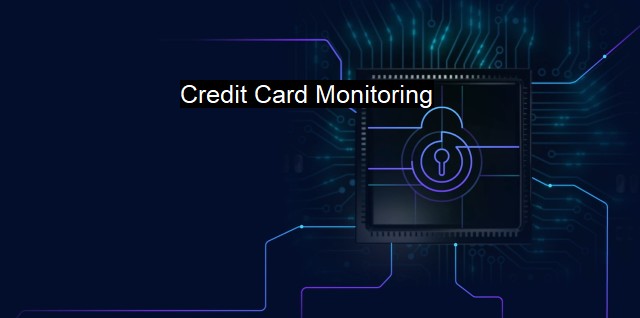What is Credit Card Monitoring?
The Importance of Credit Card Monitoring: Protecting Your Finances from Cybercriminals and Fraudulent Activities
Credit card monitoring, when mentioned refers to the practice of continuously observing, tracking, and reviewing credit activities in order to detect any irregular or fraudulent transactions. With the ongoing rise of E-commerce and digitalization, credit card monitoring has become more critical than ever for maintaining financial security and preventing unauthorized usage or purchases.Online environments have intrinsically provided criminals, hackers, and fraudsters with a vast array of opportunities to exploit consumers for financial gain. Credit card fraud represents one of the most common types of cybercrime encountered. It involves the unauthorized or illegal use of another person’s credit card information to buy goods or services or remove funds from the cardholder's account. Cybersecurity involves implementing preventative measures to deter cybercriminals, safeguard data, and maintaining the internet's integrity. This field plays a vital role in credit card monitoring.
Credit card monitoring software offers consumers a security layer protecting them from incidents of theft or fraud by constantly checking for anomalous transactions. In the event of an anomaly, the cardholder is promptly notified, enabling them to act, therefore minimizing potential losses.
Cybersecurity tools and antivirus software programs are essential to the successful implementation of credit card monitoring systems. Antivirus software can block or remove malicious software ("malware") introduced onto a user's device by hackers trying to access financial information, while cybersecurity solutions might identify, prevent and respond to varying levels of threats to computer systems, networks, or data.
Other common safety measures around credit card usage online consist of secure websites utilizing "https" protocols, while websites offering a safe checkout process usually have security certifications or encryption protection measures in place indicated by an SSL certificate (padlock icon on address bar).
There are many types of credit card monitor systems and tools. Some are designed solely to monitor credit card activity, while others monitor a wider range of financial activity including bank accounts and lending reports. It's also common for these tools to offer identity theft monitoring, tracking any instances where identity information appears in ways it should not.
Credit card monitoring tools work using complicated algorithms that can analyze numerous transactions on multiple levels. They inspect factors like user behavior patterns, repeated transactions, spending frequency, and purchase types.
Cybersecurity systems further employ learning-based models to effectively differentiate between normal and suspicious behavior. Given enough historical data, these models can accurately anticipate the individual’s patterns of spending. Whenever a transaction doesn't align with the established patterns, the system flags it for review.
Occasionally a legitimate transaction could be marked as suspicious due to unusual spending patterns. While this could lead to occasional inconvenience, many users feel this tradeoff valuable in exchange for keeping their information and finances safe.
Many credit card issuers now offer some form of credit card monitoring service. Some are free while others come at an ad additional cost. Given the possibility of recovering stolen funds marketing endeavor tougher and more expensive with time, opting for such a service is generally a wise choice.
The rising digital economy necessitates more sophisticated approaches to tackling cybercrime. Antivirus and cybersecurity programs offer critical layers of protection. Enabling credit card monitoring further fortifies your defenses, ensuring your financial information remains secure from hackers.
Credit card monitoring assists in identifying and combating credit card fraud, signaling a tangible defense against online financial theft. By coupling it with robust antivirus and cybersecurity measures, users bolster their safety against the increasing threat of cybercrime. Being vigilant in monitoring credit card activity can save consumers considerable stress, not to mention financial resources, in the long run.

Credit Card Monitoring FAQs
What is credit card monitoring?
Credit card monitoring is a service that monitors your credit card activity and alerts you of any suspicious or fraudulent charges. This service is designed to protect you against credit card fraud and identity theft.How does credit card monitoring work?
Credit card monitoring works by monitoring your credit card activity and sending you alerts if there are any suspicious or fraudulent charges. The service uses algorithms to analyze your spending patterns and detect any unusual activity. If any suspicious activity is detected, you will be notified via email, text message, or phone call.Is credit card monitoring necessary?
Yes, credit card monitoring is necessary to protect yourself against credit card fraud and identity theft. With the increasing number of data breaches, it is more important than ever to monitor your credit card activity. Credit card monitoring can detect unauthorized charges and help you take action before it's too late.How much does credit card monitoring cost?
The cost of credit card monitoring varies depending on the service provider and the level of protection you need. Some credit card issuers offer free monitoring services, while others charge a monthly fee. Third-party monitoring services can cost anywhere from $10 to $30 per month. It's important to compare the features and pricing of different services before choosing one.| | A | | | B | | | C | | | D | | | E | | | F | | | G | | | H | | | I | | | J | | | K | | | L | | | M | |
| | N | | | O | | | P | | | Q | | | R | | | S | | | T | | | U | | | V | | | W | | | X | | | Y | | | Z | |
| | 1 | | | 2 | | | 3 | | | 4 | | | 7 | | | 8 | | |||||||